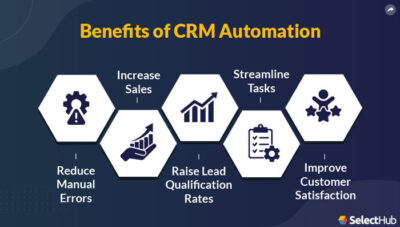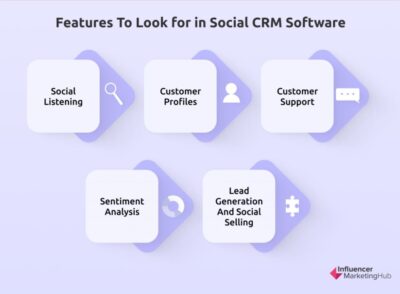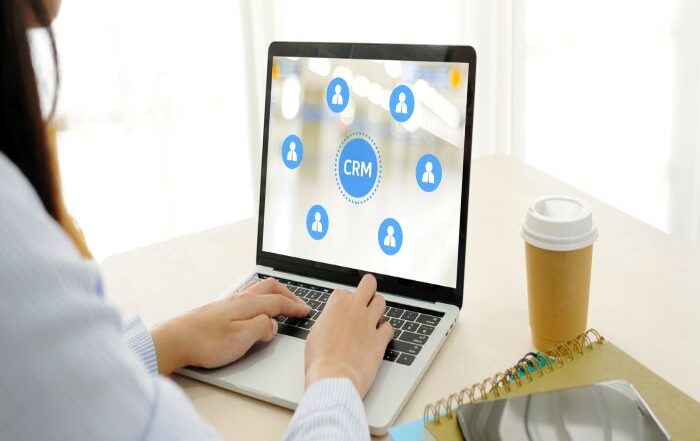4 Trends that Predict the Future of CRM
Commerce is virtually as old as time, but the last few decades, in particular, have seen a dramatic increase in the speed at which business evolves. The industrial revolution, the invention of the computer, the ubiquity of smartphones, and a million other innovations have jumpstarted new processes, tools, and standards for how businesses interact with customers.
Maintaining customer relationships is one of the essential components of a successful business—a trend that has only increased in recent years. As the number of ways customers can interact with businesses continues to grow, managing those customer relationships has become a more and more complicated task.
For your business to succeed in 2023 and beyond, it’s important that you not only have a grasp on the best tools and business practices available to you now but also have your finger on the pulse of the CRM industry heading next. These trends predict the future of CRM so that you can make the most of your most important relationships.
Trend #1: Automation and AI
While Rolodex has surprisingly survived the digital revolution, there’s a good reason most businesspeople have transitioned to digital tools: automation.
CRM itself is a type of automation of the sales process. Customer Relationship Management software tracks points of contact, email history, marketing campaigns, and more so that business users don’t have to do it by hand. Manual processes are not only time-consuming and expensive, but they’re also prone to human error as people miss deadlines, misspell names, and neglect follow-ups.
It’s only natural then that the future of CRM would include further automation. Not only does CRM have the power to replace tedious copy-and-paste emails and paper calendars, but CRM also has the power to qualify leads and automate customer service through chatbots.
While current CRM automation saves marketers hundreds of hours composing emails and drafting reports, they can automate more advanced projects like assigning leads, finding cross-selling opportunities, and automatically issuing invoices.
AI already plays a valuable role in CRM—a trend that will only continue to rise. While automation replaces tedious manual labor, AI replaces inefficient human decision-making. While AI is no replacement for human judgment, it is exceptionally good at recognizing patterns and trends that are invisible to even the most experienced users.
In the future, expect CRM to include more advanced Natural Language Processing (NLP) for further automated customer service, chatbots, emails, and more in-depth automation surrounding lead qualification and sales opportunities.

Trend #2: Personalization
CRM personalization falls into two categories: personalizing the CRM and using CRM to personalize consumer-facing messages. Both types of CRM personalization will continue to trend far into the future.
Personalized CRM
Your business is as unique as you are—the number of employees, product/service mix, industry, tone/branding, etc., all determine your CRM strategy. To accommodate your unique needs, CRM is increasingly becoming customizable.
Companies like Rainmaker help businesses customize their CRM integrations using the powerful cloud-based Salesforce platform. With Salesforce, companies can create personalized applications with customized templates that give users access to the information they need without needing to sort through the information they don’t need.
Personalized messaging
Everybody has experienced receiving an unsolicited, generic sales message that has nothing to do with their interests. As these kinds of marketing communications have become more commonplace and expected, consumers are growing both weary and wary of generic sales messages.
Personalized calls to action outperform their non-personalized counterparts. Without CRM, personalized emails have to be written one at a time and personalized by hand—a process that is inefficient and error-prone.
Using a CRM, you can easily personalize messages to your specific leads based on their name and history. In the future, we expect personalization to increase with messages composed dynamically by AI based on the user’s history, preferences, and even personality.
Trend #3: IoT
The Internet of Things (IoT) is the connection between network-enabled devices. IoT components range from Computer Aided Manufacturing machines used in manufacturing automation to pacemakers, blood sugar monitors, and other medical devices.
The Internet of Things has the potential to enhance CRM by providing unique information about consumers’ activities. For example, tire pressure sensors can provide data to flag CRM to send communications suggesting a tire replacement based on how quickly the user’s tires lose pressure. Blood sugar monitors can provide data to target communications regarding health and lifestyle services.
Facing the future, expect IoT connectivity to increase as smart devices and IoT integrations become increasingly ubiquitous.
Trend #4: Social media
Far from being a passing fad, social media is here to stay. Social media has become central to public life: human interaction, entertainment, and commerce.
Social media has become such a driving force in the business world that nearly all consumers (98%) say they plan to purchase social media, and over two-thirds say they already have.
Social media is not only a prominent advertising opportunity for modern businesses, but it is also an opportunity for meaningful communication and a source of quality information. In the future, we expect CRM to capitalize on these opportunities by collecting data from social media both broadly about customer sentiment and narrowly regarding specific leads’ activities.

Make the most of your CRM
As long as there have been goods and services to trade, there have been customers to buy them, and as long as there have been customers, there have been customer relationships to manage.
Today, customer relationship management looks radically different than it did 100 years ago and different than it will look 100 years from now. That is why coordination with Rainmaker is an important asset for any business that wants to succeed in the modern world.
Rainmaker offers Salesforce managed services and expert Salesforce integration to take the guesswork out of your CRM journey today and in the future.
To learn how Rainmaker can take your CRM to the next level, schedule a meeting today to learn how they can help.






